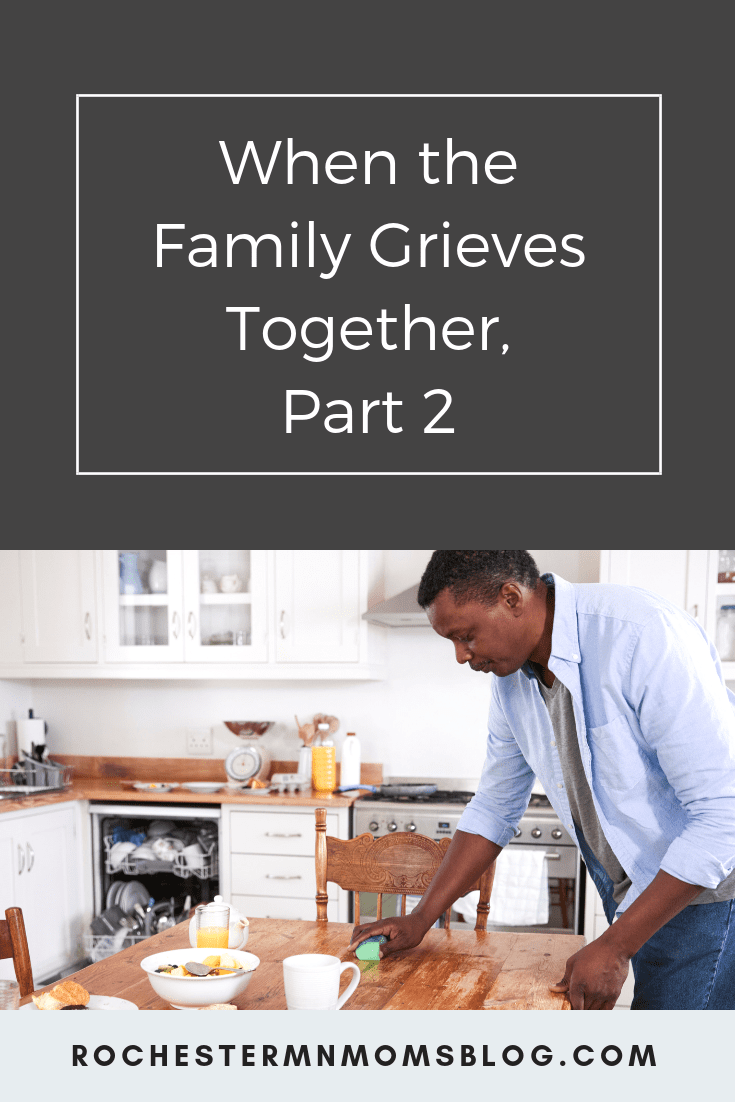
Last month I posted about how grief could be done as a family. But what if that grief is indirect – what if it’s a friend or family member that has lost someone close to them?
When someone we know has lost a loved one, we tend to jump to trying to say the right things. With the best of intentions, we say that it was God’s plan or that everything happens for a reason. But in my experience, I’ve learned that the grieving family doesn’t need us to provide answers. They just need us to be there. When we are trying to provide words of comfort and answers, sometimes our words end up having the opposite effect. Sometimes there is just no way to make sense of it, and no answer that makes it hurt any less.
I found a really great resource online of the 64 worst things to say to someone in grief and the 64 best things to say to someone grieving. In our rush to try to comfort someone, we often say something that is ignorant and hurtful – and I’ve found that silence and presence are infinitely more helpful than a poorly timed anecdote.
Being with them is worth more than anything you can do for them. But, grief has a way of paralyzing those that are left behind. Everyday tasks become mountains to overcome, and often are left undone. If you are a person of action, and you see that a friend is bogged down with this weight, offer to lend a hand.
When I was going through my divorce, I had dozens of friends say “Let me know if you need anything!” I was glad to know that so many people were willing to help me. The problem was, I never got the courage to actually turn around and ask for that help when I needed it-except when it came to moving, I did have to ask for help with that, and some awesome friends of mine came through for me.
A friend of mine ran to the store while I was moving and she said “Hey Amanda, what do you need from the store?” I explained that I was going to make a store run on my own later that day to get a plunger, a welcome mat, and other household items. “No, what do you NEED. Reeses? M&M’s?” She returned from the store with a giant bag of Reese’s AND a giant bag of peanut butter M&M’s. Now THAT’s a good friend! She made a kind and generous gesture that validated my pain.
When we say, with the best of intentions, “Let me know if you need anything,” it puts the next move on the person that needs the help – which will often lead to them not having the strength or courage to ask. I’ve found that the best way to help is to make a direct offer:
- “Hey I’m heading to the store today. Is there anything you need?” (and “need” here doesn’t have to be a necessity. I can’t tell you how much it meant to get a giant bag of candy when I was hurting).
- “I’m going to bring your family a meal. Does Tuesday work? Are there any dietary restrictions?”
- “I’m going to take care of your lawn for you. Can I come over on Saturday to do that?”
- “I’m taking my kids to the park this weekend. May I bring yours along with us?”
There are literally dozens of ways that you can help another family in their time of loss.
- Take their kids for a day
- Mow the lawn / rake leaves / shovel (depending on the season)
- Run errands
- Make a meal
- Walk/feed their dog, or other necessary pet care
- Wash their car
- Help with household chores
Don’t leave your kids out of this process – because kids love to be helpful. You know what else? Kids make awesome cards. In this digital age we have forgotten the impact that a simple card can make. It doesn’t even have to be fancy – just some construction paper, and a heartfelt note from your kid saying that they love them and are thinking of them. When your children see you caring for others, it teaches them to have empathy, and it teaches them how to appropriately respond when another family is in crisis.
It’s also important to remember that grief doesn’t have a timetable. When the grief is fresh and new, many people offer to help – but as time goes on, the person is still grieving but the rest of the world seems to have moved on. Remember that a month later, six months later, ten years later – your friends are still hurting, and it’s a great thing to let them know that you are still there for them. If you want to go the extra mile for a grieving friend, you can send them a card on an important date – an anniversary, a birthday, their first Christmas/Mother’s Day/Father’s Day without their loved one – and it doesn’t even have to be fancy. It just has to convey the message that you know they’re still hurting and you’re still there for them.


